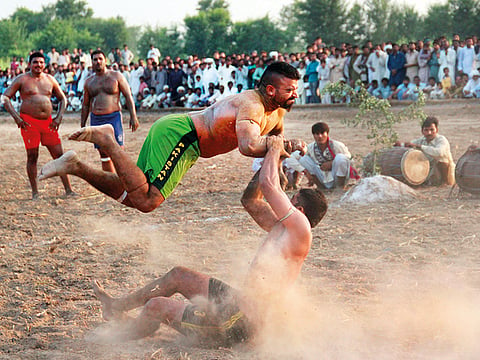Pakistan: Beyond the stereotypes
A photojournalist shows the stunning features of Pakistan that rarely make it to the mainstream news

ISLAMABAD: Rural women in multi-coloured attire, young girls learning boxing, traditional kushti (wrestling) matches, countryside kids playing football on a dusty street, tribal men learning the English language, a girl from Gilgit-Baltistan playing Rubab (a lute-like musical instrument), the rare Asian one-horned rhino, vibrantly painted rickshaws that are emblems of a cultural richness ... these are images of Pakistan so rarely seen in mainstream media dominated as it is by narrow narratives of violence, strife and politics that it drove a Pakistani freelance photojournalist to do something about overturning the stereotypes.
“All you hear about Pakistan in the news is about terrorism, politics or poverty. But the Pakistan I know and live in is more than that. Pakistan is full of colours, smiles and diversity,” Saleem told Gulf News. And then last February, as he scrolled through his Instagram feed, he came across a cascade of images from a city that was on the other side of the border, in India. The Everyday Mumbai project that was all about capturing quotidian glimpses of the bustling megapolis.
“I was so inspired by the Everyday Mumbai project and its creator Chirag Wakaskar that I contacted the global community of Everyday Projects to start a similar project for Pakistan,” he said. Thus was born Everyday Pakistan.
Boys after a cricket match at Fairy Meadows.
Everyday Projects is a photography education non-profit and a collective of Instagram feeds which represents more than 50 countries. Its mission, according to the website, is to use photography “to challenge stereotypes that distort our understanding of the world.” The collective audience of Everyday Projects is over 1 million now.
Everyday Pakistan launched early this year with Saleem as the founder/curator with the assistance of a fellow writer, Anushe Noor. What started as a one-man mission to challenge stereotypes about his homeland now boasts nearly 58,000 followers on Instagram with a significant following on other social media platforms. “Everyday Pakistan is transforming negative perceptions, one photo at a time,” Saleem said.
The Instagram account offers a kaleidoscopic view of Pakistan’s innumerable wealth in terms of its people, cultures, natural resources, traditions and way of life.
Morning exercise in progress at Shaoor primary school in Qila Saifullah, Balochistan.
From the fascinating shots of St. Patrick’s Cathedral in Karachi, Buddha statues at the Bhamala Stupa near Khanpur, shrine of Sufi Saint Hazrat Ali Hajvery in Lahore, Shri Naval Mandir Narayanpura Hindu Temple in Karachi, and a portrait of 55-year-old Pakistani Sikh from Gurdwara Punja Sahib in Hassan Abdal, Everyday Pakistan brings to light the stunning cultural and religious diversity in Pakistan.
The most popular post was of a young man offering prayer in the caves of Quetta which received more than 130,000 likes.
During Ramadan and Eid, he received many requests from all over the world to share more photos of the festival as people were curious to learn more about Pakistan.
Through the online photo documentary project, Saleem also aims to provide a platform to local photographers to promote photojournalism in Pakistan and build a community of storytellers by giving viewers an honest insight into Pakistan.
A shared sense of history
For Saleem, the greatest achievement of the project is the response of the people, and from many across the border. “Two months ago, I posted a photo of Katas Raj Temples, which is located near Chakwal in the Punjab province, not knowing that this photo would forge an emotional connection with someone across the border.”
Soon after, he received a message from an Indian follower of Everyday Pakistan saying her 85-year-old grandfather wished to speak to him. Their conversation quickly moved from English to Urdu to Punjabi. The Indian octogenarian had grown up in that area before the 1947 Partition. “The call that lasted 11 minutes made my day. I had made someone so happy with just a photo project.” It was one of his most rewarding experiences.
What Everyday Projects global founders think about Pakistan project?
1. Peter DiCampo, Co-founder, Everyday Africa and Everyday Projects: “Many parts of the world are misunderstood, but some suffer more than others from damaging media stereotypes. Just as sub-Saharan Africa is thought to be nothing but poverty and starvation, Pakistan is thought (by many in the West) to be only a place of only violent extremism. Everyday Pakistan helps us to see more, to deeper, to gain a greater understanding of a diverse, vibrant, and complex country.”
2. Chirag Wakaskar, founder, Everyday Mumbai: “It’s extremely important that we look at Pakistan through their own eyes beyond the realm of politics or the clichéd narratives of terrorism and poverty. I’ve been following Everyday Pakistan for a while now and the pictures are a constant reminder of our shared culture.”


